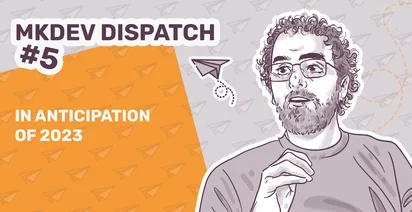In Anticipation of 2023 | ✉️ #5

Hey! 👋
We are already getting dangerously close to the end of the year, to the Christmas greetings, the millions of spam emails from all the stores that will make us buy all their products, to the dinners with friends and colleagues in which we will surely end up a little damaged by the large amount of alcohol that we will drink.
We are close to seeing people again that we haven't seen for a long time and, as in my case, making trips to places that we couldn't visit for 8 years for political and security reasons. We are close to the end of 2022 and instead of thinking about what we will leave behind, I think it is a good time to think about what we want to ask for by 2023.
I am not going to ask that the world begin to know the number "e" and that they stop loving the number "pi" so much, although we know that my request is fair. I am not going to ask that all companies leave the cloud and move back to the data center as we explained in the previous dispatch with the case of 37signals and basecamp. Nor am I going to request that inflation go down, that companies like Meta leave the metaverse and don't lay off thousands of people, that crypto doesn't collapse every 6 months, or that wars end.
At the end of the day, we are here to talk about IT so we are going to talk about IT. In this 2023 I'm only going to ask for one thing. I would like the standards to win the game a bit and not have 2000 different solutions for each case. I am going to show one example, a few of the hundreds of CICD tools we have on the market - jenkins, argocd, circleci, TeamCity, Bamboo, gitlab, Buddy, Github actions, Travis CI, Codeship, GoCD, Wercker, Semaphore, Nevercode, Spinnaker, Buildbot, AWS Codepipeline, GCP Cloud Build, etc, etc.
I know that this can be horrible for capitalism and for all the people who work in all these companies. I know I'm asking that people not repeatedly have the same idea of re-creating something that's already been created. I know we all think we can do better than anyone else, but I don't think I play basketball better than Stephen Curry. So you don't need 2000 versions of everything.
We need to remember that everything that is working in this world is using standards like the size of a paper (for example A4), the size of the ship containers (20-foot), brick size and material (ISO 5019-1), air quality standards (like The U.S. National Ambient Air Quality Standards). So if everything has standards why in many components of the IT world everything is different? I want to have an ISO rule explaining how for example the CICD should work and how to interconnect the components, and then all the companies can create their product.
So please 2023, make me happy, and remember 2023 will be the “e” year. 2.71828182845904523536.
What we've shared
What is Open Container Initiative (OCI)? Build Spec, Runtime Spec, Image Spec and more.
And a small preview of our GCP Workshop.
Prepare for your CKA certification with a real example: This time we are going to show a real exercise that can appear in your Certified Kubernetes Administrator (CKA) exam.
What we've discovered
An explanation of Kubernetes Gateway API: A potential replacement for Ingress objects, thus worth keeping an eye on.
Falling for Kubernetes: We're always saying, that Kubernetes is an API, that's the main value of it, together with built-in abstractions, and abstractions you can build with it. Author of this article describes his journey to learning the same: "Everything comes down to the kubernetes API.".
Exploiting apps on EKS: A walkthrough of how security consultancy tests one customer setup and tries to break in.
Datadog Husky: Evolution of DataDogs storage system since launch of log product till building Husky, multi tenant and highly scaleable backbone behind many of DataDog products.
Understanding AWS Lambda Concurrency: A short and visual explanation of Lambda concurrency model - and how to use it to scale your functions.
A random reminder
OpenShift 4 Cluster Operations 101 is our free video course for learning the core concepts behind OpenShift 4 cluster management, starting from re-imagined installation experience down to the fundamental features that make this system special.
The 6th mkdev dispatch will arrive on Friday, November 26th. See you next time!
